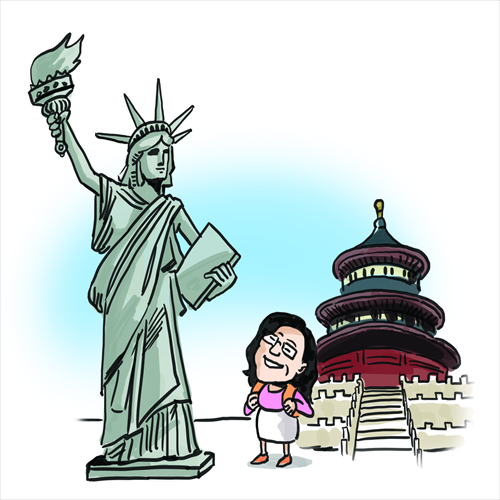HOME >> OP-ED
Are China and US increasingly similar?
By Rong Xiaoqing Source:Global Times Published: 2014-9-18 18:13:01

Illustration: Liu Rui/GT
Every time I come back to China, what impresses me most is not how different my home country is from the US, where I have been residing since 2000. Rather, it is how similar they have been getting, at least on the surface.
In the early years after my move, it was the skyscrapers and flagship stores for luxury brands that made Shanghai and Beijing more and more look appear like the twins of New York and Chicago. But now it is the disappearing distinction between lifestyles in the big cities of the two nations which has become more fascinating.
Only a few years ago, US fast food chains like McDonald's and KFC were considered to be high-end cuisine. But now their place in the food chain is similar; ubiquitous, convenient but visiting is rarely a big cause for celebration.
Meanwhile, local food chains with modern management and similarly efficient production and service methods are gaining a much bigger slice of the domestic market.
Cars have squeezed out bicycles. A lot fewer people smoke in public areas, whether young or old. There is a much higher level of general courtesy than I can remember.
More people form lines at subway stations, and actually let some people off a train before pushing on it themselves. That never used to be the case. Even if you walk right behind someone into a shop, it is more likely he or she will hold the door open for you than have it bang in your face.
The mobile device is everywhere and used all the time, whether by a waitress on her break or an office worker going home on the subway.
In many ways, China is leapfrogging ahead of the US. In this sphere. It is not unusual to see someone watching a soap opera as they walk down some steps to a train. The Internet and phone service is available in places like the Shanghai subway. Scan the car of a subway train or the inside of a bus, and you will almost never see anyone reading a physical newspaper or book. One only hopes some are reading e-books and news articles on their phones.
Just about every major brand available in the US is available here now. This is no longer pioneer territory. Quite rightly some questions are being asked: Why does a latte cost more in a Starbucks in Hangzhou than in many parts of the US? It sure cannot be that the labor costs are the same.
Having said that, though, the massive gap in wages has clearly been closing. You can see why this is no longer going to remain the cheap manufacturing champion of the world. A taxi driver in Beijing told us he earned about $12,000 to $14,000 a year. Only a few years back that would have been a lot less.
Of course, there are still differences.
Some of these are very simple. You can be embarrassed to find there is no tissue in a public and want to kick yourself for skipping the warnings in your little tour book.
You can be standing on the street, looking for an address and wondering how to find the number among so many strangely numbered buildings.
You often have a frustratingly long march before you are able to cross through a break in the steel divider placed in the middle of a road only a few yards wide.
You can be sent flying when you trip over an object that sticks out from an otherwise flat ground without warning, such as an elevated door sill. You check the fire exit in a hotel only to find it locked.
Or try to get access to foreign websites, even those not deemed sensitive by the authorities here, and it can remind you of the days of Internet dial up in the 1990s in the US. Getting hold of interactive maps can be a nightmare.
A lot of this is about keeping control. While the barrier that prevents you from getting to the bus stop by the most direct route seems silly, it wouldn't perhaps feel that on a day such as a big holiday when many thousands wanted to do the same thing. Chaos could ensue, and it wouldn't be hard to imagine people being trampled to death. You have to remember that for every American taking a bus or train, there are four Chinese doing the same.
As to the locked fire escapes and the obstacles carefully designed to trip you up, you have to think that as the legal and regulatory system develops this will change.
Free tissue? Well, that might take the longest time to change. Why shouldn't people be trained to bring their own?
To newcomers, these issues may not be as visible as the modern appearance of a city. To the locals, much of this may not be worth mentioning, compared to more urgent issues such as the air pollution that dogs them every day.
The author is a New York-based journalist. rong_xiaoqing@hotmail.com
Posted in: Columnists, Viewpoint, Rong Xiaoqing